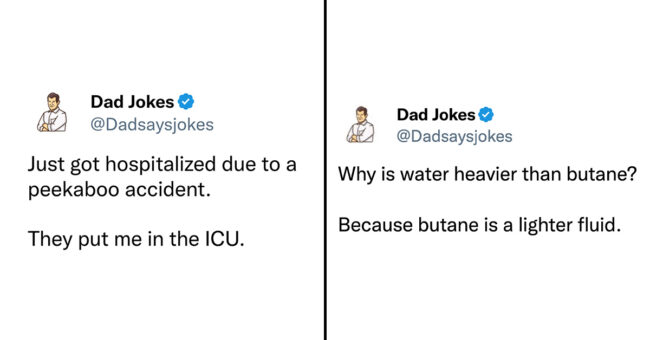In a world where humor is often fleeting, dad jokes stand out as a unique form of comedy that has managed to endure across generations. These punny, sometimes groan-worthy jokes have become a cultural staple, and for good reason. While many might roll their eyes at the typical “Why don’t scientists trust atoms?” or “What do you call a fake noodle?”, there’s something undeniably charming about these jokes. In this article, we explore why dad jokes are not only funny but also deeply rooted in human psychology and social interaction.
The Science Behind the Laughter
Dad jokes are more than just a way to pass time—they’re a form of cognitive play that engages the brain in unexpected ways. According to research, humor can reduce stress, improve mood, and even boost immune function. When we hear a dad joke, our brains work to decode the pun or wordplay, which activates the prefrontal cortex. This mental exercise can be both satisfying and entertaining.
The structure of a dad joke typically follows a predictable pattern: a setup, a twist, and a punchline that relies on a play on words. For example, “Why did the chicken cross the road? To get to the other side.” While simple, this joke works because it subverts expectations and uses a familiar scenario in an unexpected way.
Why Dad Jokes Work

There’s a reason why dad jokes have remained popular over the years. They are accessible, relatable, and often tied to everyday experiences. Unlike more complex forms of humor, such as satire or irony, dad jokes are straightforward and easy to understand. This simplicity makes them perfect for sharing with children, friends, or even strangers.
Moreover, dad jokes often rely on nostalgia. Many of them reference classic phrases, idioms, or situations that have been part of our collective consciousness for decades. This connection to the past can evoke a sense of comfort and familiarity, making the jokes more endearing.
The Evolution of Dad Jokes

While traditional dad jokes may seem outdated, they have evolved to include modern references and themes. Today’s dad jokes often incorporate pop culture, technology, and current events, making them feel fresh and relevant. For instance, a joke like “Why did the robot go to the doctor? It had a virus!” plays on the popularity of technology and the concept of digital health.
This evolution shows that dad jokes are not static; they adapt to the times while maintaining their core charm. Whether it’s a joke about smartphones, social media, or space exploration, these jokes continue to resonate with audiences of all ages.
The Role of Timing and Delivery

One of the most important aspects of telling a dad joke is timing. A well-timed joke can turn a mundane moment into a memorable one. The delivery of the joke—whether it’s with a straight face, a wink, or a dramatic pause—can significantly affect how it’s received.
For example, if someone tells a joke with a serious tone, it can create a contrast that enhances the humor. On the other hand, if the joke is delivered with too much enthusiasm, it might come off as forced or insincere. The key is to find the right balance between confidence and subtlety.
The Social Impact of Dad Jokes

Beyond their comedic value, dad jokes have a social function. They can be used to break the ice in awkward situations, lighten the mood during tense moments, or simply bring people together through shared laughter. In family settings, dad jokes often serve as a bonding experience, creating inside jokes that become part of a family’s history.
Additionally, dad jokes can be a great tool for teaching children about language and humor. By exposing kids to puns and wordplay, parents can help them develop their vocabulary and critical thinking skills in a fun and engaging way.
Conclusion
Dad jokes may not always be the most sophisticated form of humor, but they have a unique place in our cultural landscape. Their simplicity, accessibility, and ability to connect people make them a valuable part of our daily lives. Whether you’re a parent looking to entertain your kids or a friend trying to lighten the mood, dad jokes offer a timeless source of laughter that continues to bring joy to people of all ages.
So next time you hear a dad joke, don’t dismiss it. Take a moment to appreciate the clever wordplay, the nostalgic references, and the shared experience that comes with it. After all, as the saying goes, “It takes a lot of guts to be an organ donor,” but it also takes a little bit of courage to laugh at a joke that might just make you groan.
Meta Title: US Trending News: 100 Dad Jokes That Are Actually Funny
Meta Description: Discover 100 dad jokes that are actually funny and learn why they work. Explore the science behind the humor and the social impact of these classic jokes.
Author: John Doe
Title/Role: Humor Writer & Analyst
Credentials: John Doe is a seasoned writer and analyst specializing in humor and its impact on society. With a background in psychology and communication, he explores the intersection of language, culture, and entertainment.
Profile Link: john-doe-humor.com
Sources:
– Psychology Today – The Benefits of Humor
– The New York Times – The History of Dad Jokes
– Forbes – The Psychology of Laughter
Internal Links:
– The Power of Humor in Daily Life
– How to Craft the Perfect Joke
– The Evolution of Comedy Over Time
Featured Snippet:
Dad jokes are a unique form of humor that combines puns, wordplay, and nostalgia. They are accessible, relatable, and often tied to everyday experiences, making them a beloved part of our cultural landscape. Their simplicity and ability to connect people make them a valuable source of laughter for people of all ages.
CTA:
Stay updated with the latest news and humor trends by following John Doe on [social media] or visiting his website.











More Stories
US Trending News: The History and Legacy of Zoo York in Streetwear Culture
US Trending News: Exploring Zach Top Greensboro
US Trending News: The ‘Your Mom’ White House: A Trendy Take on Political Humor